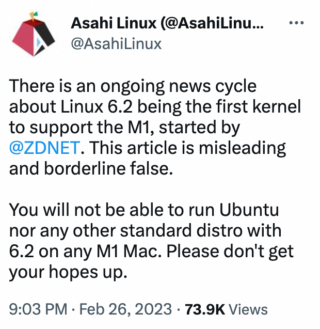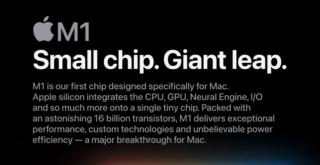Here’s the crux of the article in video form
Ever since Apple started creating its own chips for Macs, Linux enthusiasts have been waiting for that day when their favorite operating system becomes compatible with Apple’s incredibly powerful new hardware.
The wait for M1 users has been especially long considering that the chips have been out for over 2 years now. However, we’ve been hearing chirps regarding Linux finally getting support for Apple Silicon.
About 5 months ago, Asahi Lina was able to run GNOME on a native Linux GPU driver for Apple M1. Fast forward to the present, the new Linux 6.2 kernel reportedly adds support for M1 chips.
But, there’s a catch. While various publications have released stories regarding M1 support and even go as far as to say “Linux is now ready to run on modern Macs”, the reality is quite different.
The truth about Linux 6.2 on Apple Silicon
Asahi Linux, a project that aims to bring Linux support to Apple Silicon, confirmed that the article published by ZDNET is nothing but misleading and borderline false.

The Asahi Linux team provided a lot more insight into the current status of Linux’s compatibility with M1 Macs. They’ve confirmed that currently, you can’t run any Linux distro on the M1 Macs.
The Linux 6.2 kernel adds device trees and basic boot support for M1 machines, but support for trackpad/keyboard and other elements of an operating system is far from completion.
They also highlighted that you can boot an upstream 6.2 kernel on M1 desktops with 16K page size kernel builds. However, no ARM64 distro ships 16K kernels at the moment.
While you can boot an upstream 6.2 kernel on desktops (M1 Mac Mini, M1 Max/Ultra Mac Studio) and do useful things with it, that is only the case for 16K page size kernel builds.
No generic ARM64 distro ships 16K kernels today, to our knowledge.
Source
The fact that Linux is coming close to Apple Silicon compatibility with the 6.2 kernel is already great news. But it still requires a lot of third-party open-source support to be functional on Apple’s hardware.
We hope developers like the Asahi Linux team continue doing the amazing work they’ve done for the past few years and make this a reality as soon as possible.
PiunikaWeb started as purely an investigative tech journalism website with main focus on ‘breaking’ or ‘exclusive’ news. In no time, our stories got picked up by the likes of Forbes, Foxnews, Gizmodo, TechCrunch, Engadget, The Verge, Macrumors, and many others. Want to know more about us? Head here.


